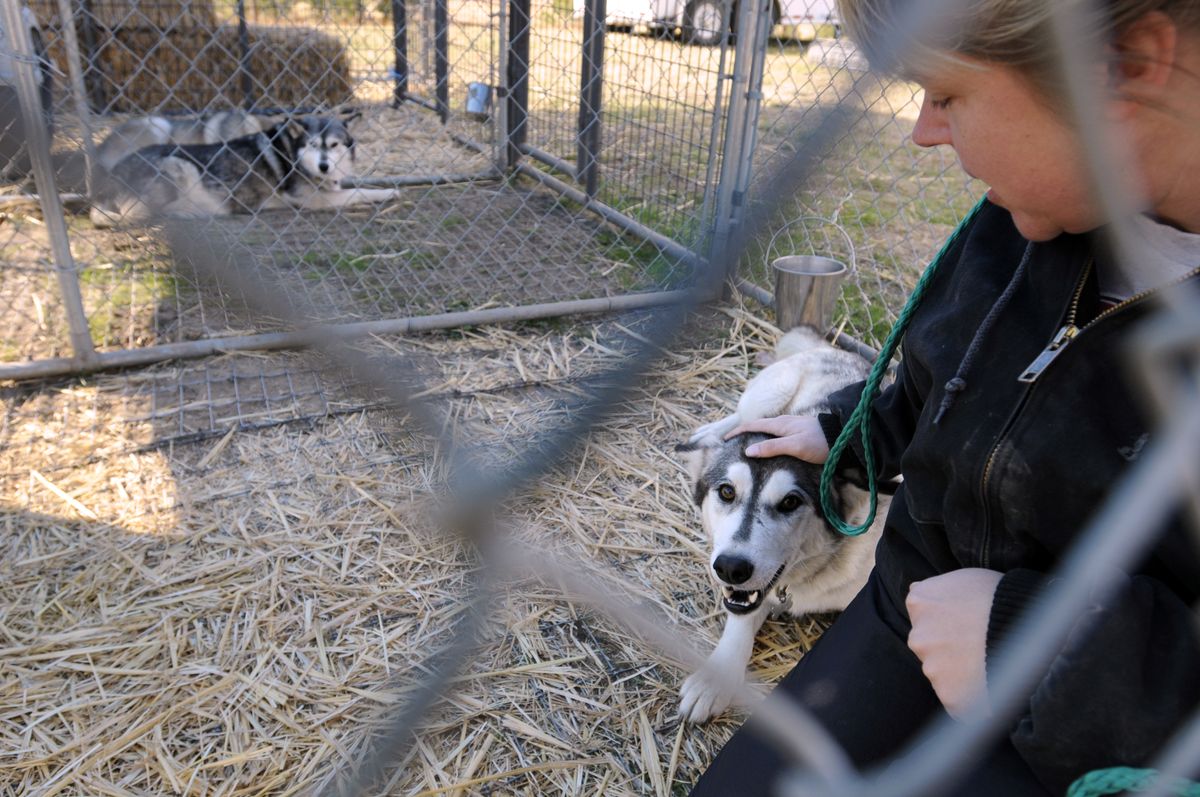Pet control scarce in rural areas
Lack of regulations tests agencies

When animal control officers arrived, they knew not to approach the dogs. The animals lived in packs in a chicken-wire pen and had little human interaction. They ate meat scraps and bones thrown through the fence.
Officers used tranquilizing darts to subdue the 36 Siberian huskies and malamutes on the property south of Colville last month, then transported them to a husky rescue group near Spokane.
The dozens of pigeons on the property found a home at a pigeon rescue, and a friend of the dead property owner took in the chickens.
That raid tested the resources of SpokAnimal C.A.R.E., which handles animal control in Spokane. It also mirrored what Executive Director Gail Mackie said has become too common in Stevens and Pend Oreille counties, which lack their own animal control agencies: rural properties packed with animals that get little physical care and less love.
“We’ve used the tranquilizer more in the last two months than we have in the last two or three years,” Mackie said last week. “Unless Stevens and Pend Oreille County develop some ordinances and have the enforcement power behind them, I think we’re going to continue to see this kind of problem.”
Residents talk about starting their own nonprofit shelters in the counties, but county-imposed ordinances and taxpayer-funded agencies won’t likely happen, officials said.
“What we need and being able to make it happen are two different things,” said Capt. Mike George, of the Stevens County Sheriff’s Office.
Ken Oliver, chairman of the Pend Oreille County commissioners, said he doubts voters see enough need for animal control to create publicly funded shelters.
“They don’t want to pass another thing that costs them tax money,” Oliver said.
Stevens and Pend Oreille counties have ordinances allowing deputies to respond to vicious dogs but none that limits the number of animals a person can own or regulates breeding operations. Neighbors frustrated by too many cats next door or a dog kennel’s deplorable conditions often seem to handle the issues themselves, Oliver said.
One man came to the courthouse a couple of years ago to complain about some cat-hoarding neighbors. He said he’d placed traps around his property that caught more than 80 felines.
The man repeated the story at a county meeting this week, Oliver said. “I’m sure that he’s probably still doing it,” he said.
Even when complaints warrant law enforcement intervention, the county sheriff’s offices often lack the manpower to respond as needed, so they call agencies like SpokAnimal, Mackie said.
The agency has seen several incidents in the past few months in which large numbers of animals were kept on rural property in questionable conditions. Last week, SpokAnimal seized at least 34 dogs from a home on Wallbridge Road, on the western side of Deer Park. That followed the late-September raid of the husky puppy mill.
Mackie credits Adopt-a-Husky volunteers with helping to find housing for the dogs from the puppy mill. Such volunteers are usually called upon in large-scale seizures.
“We called in all our partners on this,” Mackie said. “We really needed some help.”
When Ronald Poeschel died in September, he left behind the property south of Colville on Orin-Rice Road littered with bones and rotting meat. His dogs were housed in a chicken-wire pen. Females gave birth in the dirt and dug burrows to protect their puppies.
Tracie Franke, regional coordinator for the multistate Adopt-a-Husky rescue, described it as “like something from a Third World country.”
Poeschel’s family signed a waiver allowing SpokAnimal to seize the animals, and Franke joined SpokAnimal officers at the property. Eight of the huskies, four adults and four puppies, will stay at her Deer Park property as she trains them to walk on leashes and ride in cars – to become family pets. The 28 other dogs were taken to rescue organizations around the region.
Her work “takes more than a love of animals,” Franke said. “It takes a knowledge of what to do and when to do it.”
Authorities say Poeschel bred the dogs for profit and sold the puppies on the street or in store parking lots.
Stevens County sheriff’s deputies originally responded to the property after receiving an animal cruelty complaint.
One Stevens County deputy spends about half his time handling all the county’s animal-related calls, George said. The county needs two full-time animal control officers, he said, but until that happens, the office will continue prioritizing the calls and asking for help when needed.
Franke said she and others want to open a shelter in the county. Two women from North Idaho have proposed a similar shelter for Pend Oreille County, but Oliver, the county commissioner, said funding and space just aren’t there.
Money is Franke’s biggest obstacle, but she remains optimistic.
“The need is so huge,” she said.